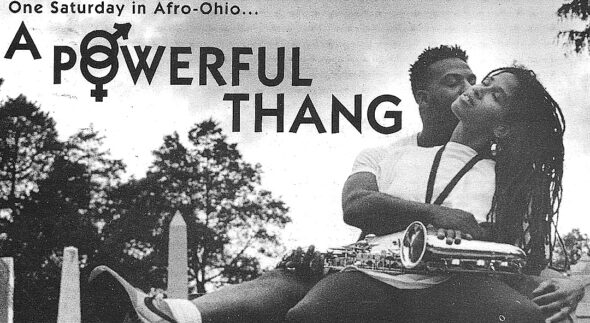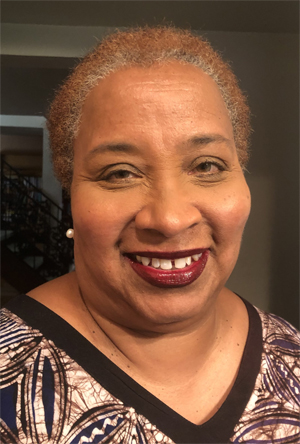
“A Powerful Thang,” which was shot in and around Yellow Springs in the summer of 1990, will screen at the Little Art on Saturday, April 2. Actors Asma Feyijinmi and John Earl Jelks, who portray characters Yasmine and Craig in Zeinabu irene Davis’ film.
‘A Powerful Thang’ returns to Yellow Springs
- Published: April 1, 2022
“Why is it that deadlines for articles always come when I have something better on my mind?”
So opens Zeinabu irene Davis’ 1991 film “A Powerful Thang,” in which the “something better” is the contemplation of sex and love, and how the two interplay with one another and with Black identity.
On Saturday, April 2, “A Powerful Thang,” which was shot in large part in the village, will screen at the Little Art Theatre, where it debuted upon its release more than 30 years ago. Filmmaker Davis will make her return to the village for the screening.
Davis, a native of Philadelphia, Pa., is a professor of communication at the University of California San Diego who continues her decades-long work in independent film. Davis came to the village in 1989 as an instructor in the film and communications department at Antioch College, and in the following summer of 1990, began filming “A Powerful Thang” in the Miami Valley.
Longtime villagers who view “A Powerful Thang” will recognize a host of familiar names in the film’s credits — Davis included the work of locals as artists, actors and crew. In an interview with the News this week, Davis said the creative impulse to draw inspiration from real people and communities — and include them in the filmmaking process — has been central to her work since her time as a student at UCLA Film School in the 1980s.
“It was common to bring in folks from the neighborhood and say, ‘Hey, I’m making a film today — want to help out?’” she said. “Neighborhood kids would suddenly be movie stars — so to speak — or people would learn simple skills, like how to use audio equipment.”
Davis’ community-minded view of the art of cinema is interwoven with her involvement in the L.A. Rebellion. That film movement, which is cited by historians as beginning in the late ’60s and ending in the early ’90s, saw Black students at UCLA Film School craft works that eschewed traditional cinematic sensibilities and centered the lives and experiences of Black people through the lenses of Black artists. In addition to Davis, the L.A. Rebellion nurtured such film artists as Charles Burnett (“To Sleep with Anger”), Haile Gerima (“Sankofa”) and Julie Dash (“Daughters of the Dust”).

On Saturday, April 2, filmmaker Zeinabu irene Davis will return to the village for a screening of her film “A Powerful Thang,” which was shot in and around Yellow Springs in the summer of 1990.
“The legacy [of the L.A. Rebellion] really is that we tried to make representations of the communities that we lived in, and we wanted to tear down that wall of mystique about how movies got made,” Davis said. “We planted seeds of how to make [filmmaking] accessible to more people.”
“A Powerful Thang,” set in “Afro-Ohio,” follows Yasmine (Asma Feyijinmi) and Craig (John Earl Jelks), a couple in the early stages of a romance as they contemplate and discuss the next stage in their relationship. Yasmine, a writer, dancer and single mother who has been celibate since the birth of her young son, is ready to pursue sex with musician Craig, but Craig is reticent.
Davis aimed to convey a strong sense of Ohio in “A Powerful Thang,” with characters framed in tight shots of cornfields, wildflowers and a covered bridge. In addition to familiar Miami Valley locations like Antioch College and Sid’s Barber Shop in Xenia, long-lost sites like Cincinnati’s Garr’s Old Southern BBQ Restaurant and the Arts Consortium are forever preserved in the narrative. Ohio is also represented in the film’s sound design: much of its music was performed by Ohio artists, including local jazz musician Tucki Bailey.
Davis said the film’s narrative was deeply inspired by people in her life. It was adapted from the journal writings of her friend Doris-Owanda Johnson, who shares a co-writing credit for “A Powerful Thang” with Davis and her husband and longtime screenwriting collaborator, Marc Arthur Chéry. Feyijinmi, who played Yasmine and is a close friend of Davis, was herself a single mother to Akin, who played the character of Yasmine’s son (also named Akin) in “A Powerful Thang.”
“I always admired [Feyijinmi] as a single mom, and I wanted that to be reflected in the film to show more authentic images of Black women as single mothers because we’re still fighting a lot of stereotypes,” Davis said, adding that casting Feyijinmi in a role that closely mirrored her own experience was crucial to Davis’ filmmaking technique.
“I use a lot of what we would call ‘social actors’ — people who are basically playing themselves in the film,” she said.
To that end, Davis’ own father, James S. Davis, starred as Yasmine’s father in a comedic scene in which the two have a frank discussion about Yasmine’s sex life. Davis said that particular conversation was lifted — some of it verbatim — from a talk she once had with her father.
“I had a really open relationship with my dad, and there weren’t very many subjects that were off the table,” she said.
“A Powerful Thang” deals openly with sex — the characters talk about it with friends and family who are supportive and positive. The camera hovers intimately close to its main characters when they think about sex. Leaning into experimental elements, the film considers sex in a variety of tones, from the lighthearted and fun, like performance poet Hattie Gossett’s chanting refrains of
“Let me see your dental dam!” and “You gotta get a rubber!”; to the reverential, when the actors’ thoughts are wreathed in verses borrowed from poets Rita Dove and Ohio’s own Paul Laurence Dunbar.
Though sex is not demonized in the film, Davis said it is approached seriously — a “powerful thing” that can wield its own influence over a relationship outside of emotional connection.
“I wanted to show the way intimacy could be for this particular couple, as opposed to most mainstream depictions of romance — the characters know each other for two minutes, and then they’re tearing each other’s clothes off,” she said. “I thought, ‘Let’s see what would happen if we reimagined this.’”
The seriousness with which the film treats sex is also indicative of the era in which it was made: at the tail-end of a deadly HIV/AIDS epidemic. The film contains only one implicit reference to the epidemic — “Just because we’re living in dangerous times doesn’t mean we shouldn’t enjoy the full pleasures of life,” says one of Yasmine’s friends — but Davis said the specter of AIDS was present throughout the consideration of the film’s narrative.
“It’s always important to place value on intimacy in the way that we respect and honor each other’s bodies, but at that time, we did have to be way more careful,” she said. “If you were sexually intimate with somebody, you could die from that experience.”
By the time “A Powerful Thang” was finished, Davis had moved on from Antioch College to a position at Northwestern University in Illinois. However, in tribute to the community that helped foster the creation of “A Powerful Thang,” Davis arranged for village audiences to be the first to see the film: It had its world premiere on Sept. 29, 1991, at the Little Art Theatre. In that same spirit, Davis will not collect any fees from ticket sales at the upcoming screening, with all funds to benefit the Little Art.
Davis said she’s looking forward to returning to the village and seeing the ways it’s changed since she preserved it on film more than 30 years ago. In the intervening years, she’s produced a number of other films, including an award-winning documentary on the L.A. Rebellion, “Spirits of Rebellion: Black Film at UCLA,” and the acclaimed feature film “Compensation,” titled after the Paul Laurence Dunbar poem of the same name. “Compensation” is currently being restored for a re-release in theaters and on Blu-Ray by Criterion in 2023.
Davis said the upcoming screening, which will be followed by a screening that evening at the Wexner Center for the Arts in Columbus, won’t be the only time she returns to Ohio. She’s set to begin pre-production on her next film, “Stars of the Northern Sky,” a hybrid documentary on Phyllis Wheatley, Marie Joseph Angelique and Sojourner Truth, this summer, and will begin scouting for locations in Ohio.
“I want to shoot part of the film in Akron, where Sojourner Truth gave her ‘Ain’t I a Woman?’ speech,” she said. “So I’ll be back!”
“A Powerful Thang” will be screened at 11 a.m. on Saturday, April 2, at the Little Art Theatre. Admission is $7. For ticket information, visit littleart.com.
The Yellow Springs News encourages respectful discussion of this article.
You must login to post a comment.
Don't have a login? Register for a free YSNews.com account.












No comments yet for this article.